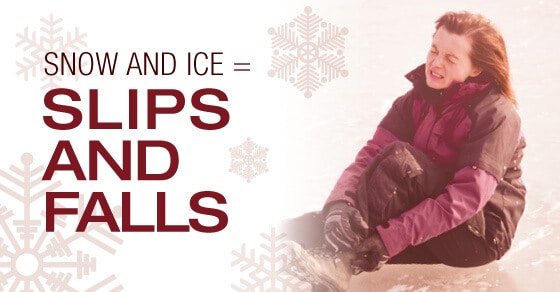
During the winter months, the odds of someone – regardless of age – slipping and falling increase every time the area is visited by Old Man Winter. Snow and ice can make even the most secure surface treacherous, and property owners bear responsibility for reducing the likelihood of a fall when surfaces turn icy.
Should I Clear My Snow and Ice
In Indiana there is only one specific snow removal law on the books; most municipalities have some sort of regulation in place to guide property owners in their responsibilities to the public.
The main law regarding snow removal in Indiana concerns where to place the removed snow. Property owners must exercise reasonable care not to interfere with safe travel on public roadways; a hazard or obstruction such as a pile of snow scraped from a sidewalk or parking lot needs to be placed out of the way of a public roadway. While this may fall under the heading of common sense, laws such as these exist in order to protect the public from danger.
It is the responsibility of property owners to make an appropriate effort to clear snow and ice from their property in order to reduce the likelihood of someone slipping and falling on their premises. Scraping and plowing large areas, shoveling entrances and sidewalks, and putting down salt and/or sand are all measures that can be taken to provide a reasonably secure surface. Repeated winter blasts can complicate these efforts, but property owners must work to keep surfaces clear.
In Evansville, the occupant or owner of a property is required to remove snow and ice from the sidewalk and entrance to their premises. If the weather is such that removal is impossible, the responsibility shifts to providing traction on the surface by the application of salt and/or sand.
Staying on your feet
Even with the responsibility of a property owner or tenant to keep their sidewalks and entrances clear, it’s always a good idea to take precautions to prevent falling during icy weather.
- Pay attention to your feet – Proper footwear can go a long way toward giving you needed traction on an icy surface. Shoes with lugged rubber soles provide the best form of traction on ice and snow, and on indoor surfaces that are wet from tracked-in snow.
- Slow down – If you usually walk at a brisk pace, walking slowly might be a challenge. But a slower pace and shorter steps can help you to navigate a slick surface more safely. Short strides help to keep your body centered over your feet, which allows you to adjust if your feet start to slip.
- Keep your hands free – Our hands and arms are part of our natural equilibrium, and our bodies’ automatic reaction to a fall is to use our arms and hands to rebalance ourselves or break the fall. Try to avoid carrying items across slippery surfaces, and leave your arms free to help you stay upright.
- Take care getting into or out of a vehicle – Many times, parking areas are slick with packed snow or ice, and it’s easy for your feet to slip when you move from a sitting position inside your car or vice versa.
- Don’t assume a cleared path is a sturdy path – Black ice is dangerous and hard to see, even on surfaces that appear to be clean.
- Watch for vehicles – Just because you’re using a sidewalk, don’t assume that you’re safe from traffic. A car sliding on a slick surface may not be able to avoid pedestrian paths. The same goes for pedestrians and vehicles in parking lots.
- Indoor surfaces can be slick, too – During winter weather, it’s hard to keep the outdoors from coming inside, and building entrances often harbor wet floors and slip hazards. Don’t assume you’re home free once you get indoors.
While most property owners do indeed look out for the welfare of those entering their property, there are some who don’t put forth the necessary amount of effort to assure no one falls. It is in these instances that speaking with a slip and fall attorney with experience in premises liability laws is in the best interest of someone who has been injured. Contact Gerling Law if you’ve been injured in a slip and fall accident – it won’t cost you anything to see if we can help!
